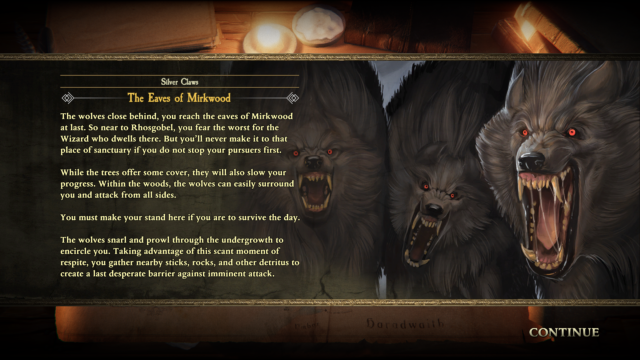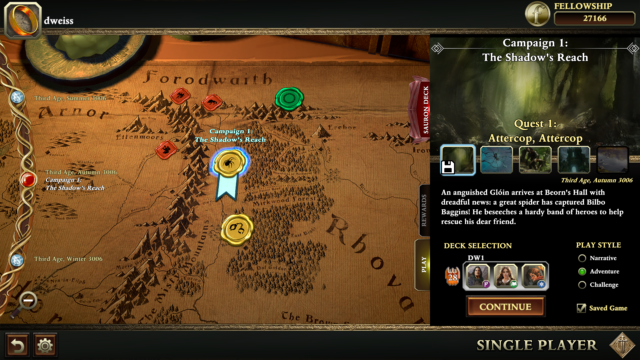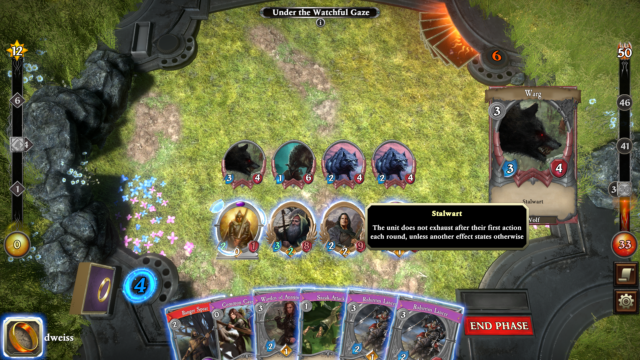Last week I did a deep dive into tabletop games based in the world of Tolkien’s Middle Earth, just to provide some context for myself (and you) around the recent public launch of Fantasy Flight Online’s digital adaptation of its Lord of the Rings: The Card Game. I’ve had a few weeks to muck about with it and I’m ready to share my take on it.
Notice I said “adaptation” and not “port”, and that the title is different. That’s on purpose. It’s not a direct one-to-one mapping from analog to digital. You’re not going to be able to load your physical cards into some digital database and play your decks and scenario packs portably. For some, that’s been a huge disappointment. When the digital version first launched on Steam Early Access in August 2018, a lot of fans of LotR:TCG slammed it as a Hearthstone knock-off.

Ironically, those who came to the game via Hearthstone or similar online card games also thumbed it down, but for different reasons. They missed the competitive aspect: leaderboards, arena play, trash talk, etc. It had multiplayer, but the co-op nature of the game just didn’t turn their cranks. Plus, the game definitely did not wrap you in bubble paper the way so many modern games do: it is hard, despite a comprehensive five-part tutorial that takes you through all the mechanics.
As for me, I come with a feet in both camps, having enjoyed LOTR:TCG to some extent but finding it a bit dry and abstract, and also having disappeared slightly down the Hearthstone rabbit-hole (I may or may not have once dropped $50 once during a sale on packs). And I say: LotR:ACG is a really good game that takes the best aspects of the analog version and lets the computer provide the immersion that was lacking in the original as well as take over managing the fiddly bits and provide the necessary randomization to ensure replayability. You still get all the deckbuildy goodness of the original and are able to unlock new and better cards by completing both quests and one-off scenarios.

OTOH, FF has obviously not abandoned the LCG pricing model, so be prepared to play the tutorial and a couple of quests for free and then open up your (Steam) wallet for DLC. You earn in-game “Fellowship” currency for completing quests, but as of now the only thing you can use them for are cosmetic things like avatars and card-backs.
I see I’ve skipped ahead and given the big picture first, so I’ll take a couple of steps back. LotR:ACG is made up of Campaigns; so far there are two available, along with three separate one-off challenge scenarios. Each Campaign can be played independently and at one of three difficulties. The first time through you play Narrative with a pre-selected deck that matches the storyline; if you beat it you unlock Adventure and Challenge which lets you use a deck of your own design.

Campaigns in turn are split into five Quests, each of which has to be beaten before moving on to the next. Quests in turn are composed of three or four Encounters which are the basic units of gameplay. The goal of an Encounter is usually to explore a particular location or kill a certain number of enemies, but I’ve been pleasantly surprised at the variety of other win conditions I’ve seen so far, which keeps the gameplay fresh. Once you’ve achieved the goal you can travel to the next Encounter, and it’s usually optimal to do so as soon as possible. The final Encounter is usually a boss fight.
Gameplay is a hybrid of LotR:TCG and Hearthstone in a series of rounds that begin with you and Sauron each getting resource income (which is used to play cards from hand and activate special effects) and new cards. Then you take turns taking one action each until both sides pass, whereupon the round ends and so on and so on. An action consists of playing a card from hand, attacking with one of your heroes, using a hero to explore a location or accumulate Fate Points, or activating a hero’s special power.
If you accumulate enough Fate points you get to activate (as a free Action) special one-time bonuses–some of which can make the difference between winning and losing. Meanwhile, the Threat clock is always ticking, and Sauron also gets goodies when it reaches certain thresholds, so anything you can do to wind it back is a good thing.

As far as I’m concerned gameplay is more than solid. The artwork is great, but the interface could use a couple of tweaks. Having to click on the lower left to go back a screen is a pain (why not bind to Esc?) and the mouseover hotspots on keywords are tiny, which usually forces you to click through to a glossary which lacks a search function so you have to scroll down to find the one you want. I turned the sound off after a few minutes, because although the music was fine and I swear the intro screen narration was done by Cate Blanchett herself, the voice acting in general was not great (bad fake British accents mostly) and persistently annoying: not only does each main hero card arrive on the table accompanied by some inane catchphrase, but every time you click to activate them they go off yet again.
So. Do you need to buy this game? I would say that if you never played the analog card game and are looking for a digital solo experience of the Middle Earth realm, LotR is the one to beat. I have no hankering to play it multiplayer, but if you and a buddy are looking for a change from the PvP arena, I’d definitely look at it. Meanwhile, if you’re a diehard fan of the LCG and wanted a digital port you’re out of luck, but if you’re willing to shell out some more coin for a different but similar kind of experience I think you’ll find it rewarding.
Thanks to fortyseven communications for providing a review copy of Lord of the Rings: the Adventure Card Game.
Comments
No comments yet! Be the first!